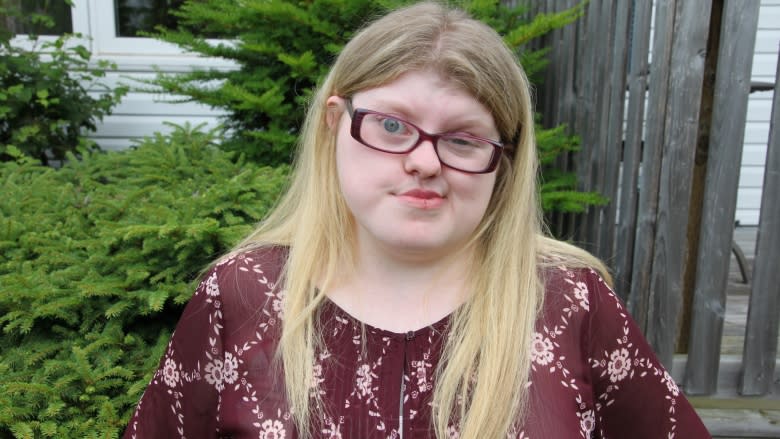Meet the Saint John teen whose rare syndrome can't slow her down
Kennedy Weir's bedroom suits her bubbly teenage personality: bright purple walls, glittery throw pillows on the bed, posters of high school musicals, grad photos of her friends, and snapshots of New York City.
"Here's me," Kennedy said, pointing to a photo of her onstage in the Harbour View High School production of Fiddler on the Roof.
With her long, blonde hair, makeup on point, and a busy social schedule, she's very much a typical teenager.
But Kennedy's life has been far from ordinary.
The Saint John woman wears a hearing aid implant. For nine years, she was fed exclusively through a feeding tube. She has facial palsy, resulting in an inability to control her facial muscles on one side, and difficulty swallowing.
She was born with two larges holes in her heart which required two open heart surgeries before she was six years old, plus others procedures to correct breathing and stomach issues.
At age 19, she's had a total of 20 surgeries.
Her constellation of symptoms is collectively known as CHARGE syndrome, a rare genetic disorder that arises during early fetal development.
The name is an acronym for the various ways in which it affects the body: C - cranial nerve defects, H - heart defects, A - atresia of the choana (blocked nasal breathing passages), R - retardation of growth and development, G -genital underdevelopment, and E - ear abnormalities.
"It was pretty tough for me when I was a little kid," said Kennedy. "But I am happy to just be here and I am stronger today."
'She did not breathe at all'
Kennedy is the youngest in her family, with two older brothers, Ryan, 28 and Kyle, 26.
Her dad, Graeme, is a blueberry farmer. Her mom, Lisa, is a special education teacher for students who are deaf or hard of hearing.
When Kennedy was born, "she did not breathe at all," Lisa said.
A rare anomaly called bilateral choanal atresia caused the nasal passages leading to the back of Kennedy's throat to remain "a complete wall of bone."
The silence when she was born was the first indication Lisa and Graeme had that something was wrong with their baby.
"It was a panicked thing," Lisa said.
Kennedy was diagnosed with CHARGE the same day by Saint John Regional Hospital neonatologist Dr. Cecil Ojah, and airlifted to the IWK Health Centre in Halifax four days later.
The Weirs were "at the library of the IWK, in tears, reading old journal articles and trying to contact people when she was just a few days old," said Lisa.
"Our philosophy was that knowledge is power, and we've always tried to maintain that."
Graeme and Lisa subscribed to medical journals, got up-to-date with the latest research, and became involved with the international CHARGE Syndrome Foundation in 2008.
Early on, Kennedy said her parents instilled in her core values of optimism and hard work, enrolling her in extracurricular activities ranging from cheerleading to musicals, and encouraging her success in regular classrooms with modified curricula.
"You can never give up," she said. "You have to keep on going. Sometimes it feels like it's a mountain to climb, but give it all you've got,
"Now is your time."
'Like our family reunion'
On July 26, the Weir family will travel to Orlando, F.L., to take part in the 13th International CHARGE Syndrome Conference.
The two-day gathering features a keynote speech by Bill Barkeley, who is deaf-blind as a result of Usher's syndrome and now works with disability-related groups.
Lisa, who serves as the vice president of the CHARGE Syndrome Foundation, said she's attended the biannual conference every year since 1999.
The conferences and other parents have been a "lifeline," she said.
"For once in your life, you're in this gigantic room with people who all get it. That doesn't happen very often."
The Weirs are the only family from New Brunswick attending.
"I will never and could never miss one," said Lisa. "It is like our family reunion."
'I'm a go-getter'
With her most serious physical issues behind her, Kennedy said she's ready to tackle the next major challenge: finding a paying job.
"I would love to work at some place like Harbour Station helping out there with ushering," she said.
"Or a place like the Interaction Children's Theatre because I love being in theatre. I want to keep on volunteering until I get a job. I am a go-getter."
Kennedy could benefit from a few minor adaptations in a workplace, such as having co-workers wear a pen-sized amplifying device for her personal frequency modulation (FM) system so that she can hear them better.
Lisa worried that's an obstacle for some prospective employers.
"I think the biggest challenge now is employment for individuals with disabilities," said Lisa. "There's a lot of good programs, but that seems to be the next thing that we're facing for Kennedy."
In the meantime, Kennedy said she's looking forward to volunteering at Area 506 Festival in August because she "loves interacting with the public."
"Just remember that we are all people," she said. "We are all the same, we all have bad days and good days,
"But at the end of the day you realize, 'I might have CHARGE syndrome but I am strong and healthy.' I just want to get involved in my community and be myself."



